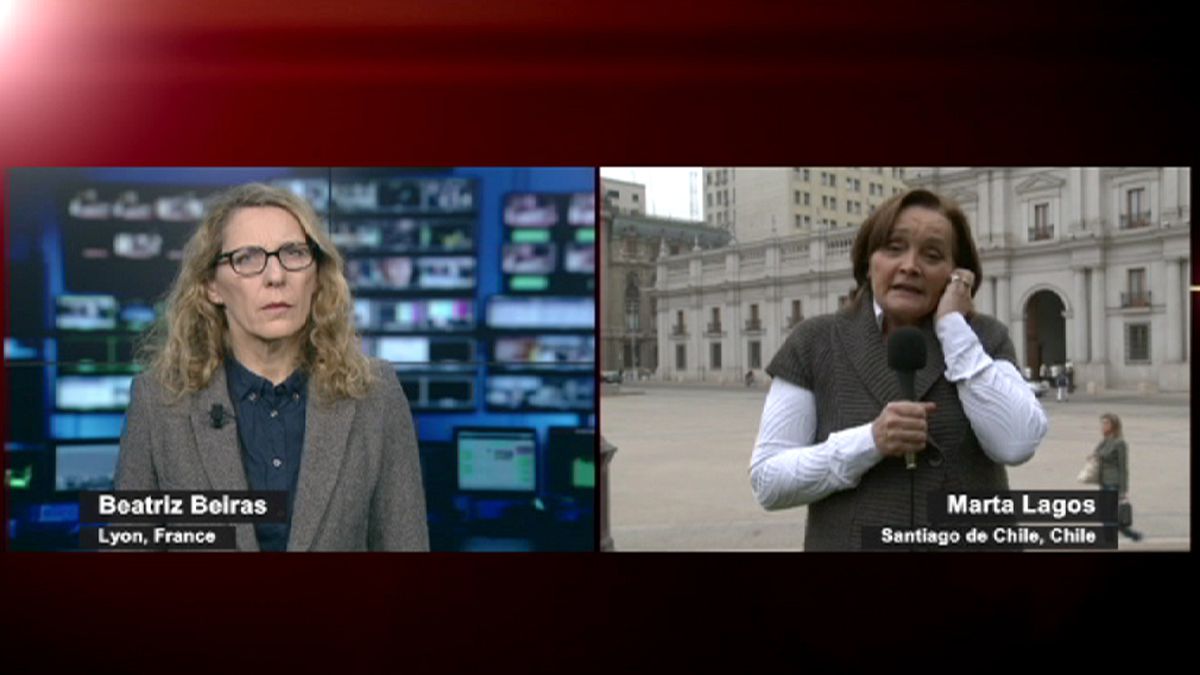In Chile’s extended presidential race, there is one candidate of the left, another of the right. One wants a clean break from the Pinochet legacy, the other does not. Former president Michelle Bachelet is competing with former labour minister Evelyn Matthei to take Chile forward.
The showdown will follow the weekend’s first round voting. Bachelet was not expected to have to continue campaigning, but with a 25 percent score, Matthei made it happen.
Bachelet’s score was around 47 percent. She will need parliament’s support to make good on reform promises. A constitution from 1980, written when dictator Augusto Pinochet ruled, requires a majority to reform the national charter. Project number one: dare to reform the constitution.
Also of foremost importance is Bachelet’s ambition to reform education, from pre-school to university.
Ahead of the election, she said: “We will carry out a process that allows us to have a new constitution, a modern constitution that enshrines the idea of a welfare state that guarantees rights and the exercise of those rights for citizens.
“The task we should undertake that is the most transformative and deepest is educational reform- a reform that will insure quality public education, that is free and without profit, that is inclusive, in the belief that education is a social right and not a commodity.”
The students of Chile have kept up pressure demanding an end to paying for university, a system that has required so many to take on personal debt. This is in a country long divided by economic and social principles at odds with each other.
Chile under Pinochet privatised social systems, notably education and healthcare. Bachelet’s strongest opponent, Evelyn Matthei, has argued for staying with neo-liberalism, while Bachelet has committed to a root and branch national overhaul.
This was the first time Chileans were not obliged to vote, and many stayed home. The next opportunity lies four weeks away – four weeks in which the top contenders for the presidency will lobby hard to convince the country with their vision for Chile’s future.
We spoke with a social expert in the Chilean capital, Santiago, for her view of the political climate.
Beatrice Beiras, euronews: “To analyse the first round results of the Chilean presidential election we are with Marta Lagos, in Chile, founding director of the private non-profit Latinobarómetro Corporation. The next round will be on 15 December; yesterday’s vote was inconclusive for Michele Bachelet. She came within three points of winning. Could we call this a bitter victory for her and a soft defeat for Evelyn Matthei?”
Marta Lagos: “I’d say it is rather a searing failure of the right in Chile, because after just one term of a government of the right, power is being returned to the coalition that it removed from power. I believe that what comes across as a failure today is the right wing’s extreme right option, with a candidate from a party made up of the oldest former members of the Pinochet government. We also see here a failure of ‘pinochetismo’, and there’s an enormous demand to move towards the centre.”
euronews: “Neither of the next round candidates can count on support from the other candidates, who have already ruled that out. Does this translate into a more polarised second phase of campaigning?”
Lagos: “The big problem of the second phase is going to be voter turnout. Yesterday, we saw that only 49 percent of Chilean voters cast their ballots. That is the lowest participation rate in Chile since 1990 – the lowest in the region since democracy was restored. We are scraping bottom now, in terms of political representation. What is in play here is the construction of a democracy that will allow all citizens to be called on; the binomial law that is a leftover from Pinochet doesn’t permit a representational system: that is what is at stake in these elections.”
euronews: “Michele Bachelet proposes a series of reforms for Chileans to consider, including changing the constitution inherited from the dictatorship, including higher taxes for big companies and tax-funded quality education. Will her coalition have enough weight in parliament to carry these reforms through?”
Lagos: “Yes, at the moment the new majority is of 20 MPs more and five senators more than the other side has; this gives her the four-sevenths necessary to carry out certain reforms. She still needs two or three senators more to reform the constitution. She has enough support in the lower chamber for that but not enough in the upper chamber. She’s missing two or three voices there, but yesterday Chileans went to the ballot box to vote for change, and they voted for a transformation. I believe a very clear message came out of yesterday’s legislative elections: it gave a very powerful parliament to the new president, to make these reforms.”
euronews: “And several leaders of the students’ movement have also entered parliament.”
Lagos: “Four leaders of the 2011 students’ movement have got in, some of them elected with an overwhelming majority – with 87 percent backing by the population, and that puts a lot of force behind reform of the educational system. The only problem now is that we’re at a bad economic conjuncture, and the price of copper has dived. Chile’s reforms will very probably have to be financed by going into debt, but, thank God, we don’t have any debt now, and I hope we’ll be able to borrow.”
